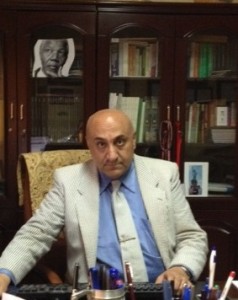Exclusive Interview (Part 2) with Professor Anwar Sheikha by Harem Karem:
HK: Do you have any comments on the expired medicine scandal?
AS: As we are seeing a very lucrative market for medicine in Kurdistan, I think the courts should have their proper role in prevention and punishments. In fact, I think punishments should be up to the level of patients’ suffering. Personally, I have zero tolerance for this.
HK: Back in 2008, you asked for more US support, did you get it? Are you still looking for that?
AS: I moved back from Mississippi and introduced the chairman of my department to the local political figures. After he realised this is a place to serve, we had a memorandum of understanding with the Mississippi medical centre, and through their visits and contributions, in my specialty, I’m glad that we are now providing the best service for the people. So, yes, we got the moral and personal support, and of course the financial support coming from the United States which is beyond my limitations.
We certainly require more support. Just a few months ago, I arranged a conference and invited people from the best cancer centres around the world – we had a gathering of around four hundred physicians – we are now more mixed with the Americans assisting us. My chairman Professor Michael Hughson has been in Slemani for the past five years, he is working free of charge and has managed to solve several key issues that existed within his field in Kurdistan. This is why we need more people like us coming here to contribute in their own fields and laying down the foundation.
HK: What about political support from within Kurdistan? I understand you have had the personal support of the PM.
AS: There are unfortunate situations and I mean not from prime minister himself, he is a very nice guy. But I went through very tough time. Here I’m back for the past ten years without salary and spending my own money. On top of that, I’m also helping to graduate people on my own expenses, but still the environment isn’t very friendly. But, then again, that shouldn’t deter you into avoiding everything. I know many of my friends returned and expected red carpets: there is no red carpet and you have to struggle. There are also minor issues such as jealousy, but I’m not concerned about those, I feel comfortable helping my people. All I want is, in ten to fifteen years-time when I leave on my crutches, I will turn back and see a new generation of cancer and blood specialists serving these people. This is my ultimate goal. I don’t need money.
HK: What are your thoughts on traditional Kalashakh – currently practiced in every town of Kurdistan?
AS: You have now spent three hours in my office and seen several patients coming in for check-ups with lots of blood in their body. If you don’t have enough blood in your body, we call it anaemia, if you an excessive blood, we call it Polycythemia. It was definitely a good thing in the old days, but right now it’s dirty, it’s unhygienic, we have much better way of helping these people using a needle and extracting a unit of blood rather than going to these unhygienic places. If I had the administrative power, I would have closed down all of these places where Kalashakh is practised. I don’t think they should be allowed to practice traditional medicine. We currently have much better ways of dealing with an increase of the blood cell count than those traditional ways.
HK: Moving on to your publications, have you managed to publish the following books yet? (‘One Thousand Multiple Choice Questions in Hematology’and ‘Hematology for Middle East Students’)
AS: As a medical student, my initial concern was degrees; I remember I was ready to give ten years of my life just for one membership. After travelling around the world and obtaining eight qualifications, when I reached a point of satisfaction, I realised that I was missing something. That’s when research became my hobby, then I published several papers and then I realised how nice it was to see my papers are published in international journals. Hence I concentrated entirely on research for more than ten years. I now have fifty-plus papers published in peer-reviewed international journals, I have five papers published in cancer journals, and twenty four of my papers are cited by the Congress Library in Washington DC. I can comfortably say that I have enough materials for fifty more papers in the near future. I’m also looking forward to publishing my books, especially for Kurdish medical students, which are currently in the pipeline.
HK: Any future plans you would like to share with the readers?
AS: I’m very optimistic about the future. With the current progress, I have a feeling that within a few years, we could be back as one of the top Middle Eastern health centres. Unlike the old days where the good medicine was supplied only to the capital city, today there is a form of decentralisation and that allows me to make Slemani the capital of my specialty, which I’m determined to do. This is because of the location, security and finances. I have a feeling that the future will be different here.
Copyright © 2013 Kurdistantribune.com
.jpg)



